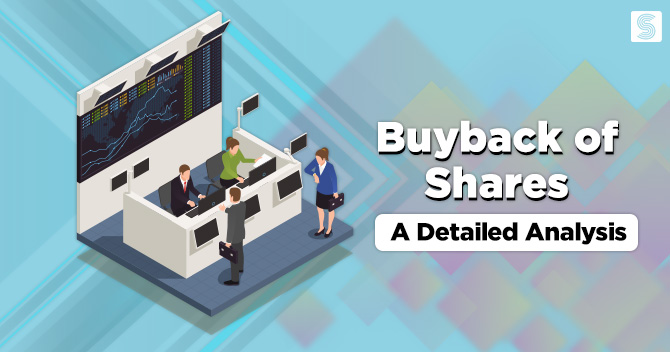Highlights and Challenges of Buyback of Shares

Dashmeet Kaur | Updated: May 07, 2020 | Category: SEBI Advisory, Share Purchase
Buyback refers to the corporate action wherein a company purchases its own outstanding shares from the existing shareholders at a price higher than the market value. A company buys back its shares for an array of reasons, such as to inflate the value of remaining shares by reducing their correspondence supply in the open market, improving earnings per share and return on net worth. The process of buyback is an efficient method of providing funds to the shareholders instead of dividends. Section 68 of the Companies Act, 2013, states that any listed or unlisted company which possesses limited shares or guarantees with share capital can choose to buy back its shares and other securities. This blog will highlight the Pros and Cons of Buyback of Shares.
Table of Contents
A brief about Shares Repurchase
Share repurchase or share buyback is a process of repurchasing those stocks which were earlier issued by the company to shareholders. It is one of the significant modes of restructuring a company’s capital, and accentuates on the objective of increasing the earning per Share. There are various pros and cons of buyback of shares that companies can avail.
Different Methods of Share Buyback
A company can repurchase its shares in the following ways:
Buying share from the Open Market
In this method, the company purchases its stocks from the open market. Such a transaction usually happens with the assistance of a broker. The repurchase program takes place for an extended time frame since a large block of shares requires to be bought. The company is not restrained from conducting the repurchase program after the announcement, besides it has the option to cancel it. If the open market method is effectively implemented, it can be cost-effective for the company.
Fixed Price Tender offer
As the name suggests, in this method, the company issues an offer to buy a fixed number of shares at a fixed amount of price to its shareholders. Generally, the price offered by the company is more than the current market price of the stock. In the fixed price tender offer method, the shareholders get an option to either sell back the shares or hold them. If the total number of shares exceeds the shares required by the company, then the shares are repurchased on a pro-rata basis[1] It is a quicker method, but it can be costlier than the open market method.
Dutch Auction Tender Offer
This is similar to the fixed price tender offer. In this method, no fixed price is specified; instead, the company offers a range of prices to its shareholders, but the minimum price is above the current market price.
Repurchase by Direct Negotiation
In this share buyback method, the company reaches out to only those shareholders who have a large block of shares. Companies pay a premium price more than the current market price to the shareholders. It is a cerebral approach that enables a company to negotiate with large shareholders directly.
The methods mentioned above provide several pros and cons of buyback of shares to the companies depending on their chosen method.
Also, Read: Buyback of Shares: Meaning and Its Purpose
Pros and Cons of Buyback of Shares
There are both advantages and disadvantages of shares buyback. Have a look at some of the pros and cons of buyback of shares:
Advantages of Buyback
- Flexible in Nature- The buyback of shares can be done for an extended period, unlike dividends, which need to be paid immediately. A company is not legally obliged to conduct the share repurchase program. Moreover, the companies get the flexibility to cancel or modify the repurchase program as per their needs. Besides, the shareholders are also under no compulsion to sell back the shares, and they choose to hold them if they wish to.
- Tax Benefits- In some countries, a lower capital gain tax rate is levied as compared to the dividend tax rate. The buyback of shares is taxed under the capital gain tax category, so the investors prefer to share repurchase over the cash dividend in such countries.
- Gain More Control– Some companies use a share repurchase program as a means to regain control of the company itself. When a company is traded in the open market, the decisions regarding its future depends on shareholder’s votes. Hence, many companies regain its private control by repurchasing public stocks with buyback programs.
- Signals the Growth- Share buyback creates a positive image of the company. Companies repurchase shares as they perceive it to be undervalued and want to attain prospective growth.
- Increase Shareholder Profits– The share repurchase plan can help the remaining shareholders of the company to improve their profits. When the issuing company repurchases the company’s shares, the shares get automatically reabsorbed into the financial assets of that company. The number repurchased by the company reduces the total number of outstanding shares available in the open market for stockholder purchases. As the supply of shares is reduced, it may increase the demand and purchase price of the remaining shares. Thereby, buyback raises share price, which benefits those stockholders who retain the company stock.
- Build Investor Confidence- Many companies invest in a share buyback plan to obtain investors’ confidence in the company. Repurchasing company stock showcase that the company has stabilized operations and future success. An investor ascertains that a company will not purchase a worthless stock, so the company stock repurchase can boosts investor’s confidence to create a buying surge of the stock.
Disadvantages of Buyback
- Unrealistic pictures- Share buyback increases some ratios like ROA, EPS, and ROE. However, such rates are inflated not because of the increase in profitability, but due to a decrease in the outstanding shares. Thus, there is no organic growth in profit, yet the buyback represents a positive image which set off the economic reality of the company.
- Error in Valuation– There is a scope of mistakes in valuing the company. In case, the buyback plan is undertaken with the purpose to reinforce the undervaluation, but the company overestimates its prospects. It makes the entire process of buyback futile.
- Sinking Dividend- Often, companies spend plenty amount of money on purchasing the shares and cuts their dividend simultaneously. After spending money on buying back the shares, the company has less cash to give out in a quarterly dividend. If you are an investor who relies on dividend, checks for the company’s income as this could pinch you in the pocket.
Conditions to be fulfilled before Buyback of Shares
Companies Act, 2013, has listed stringent conditions for buyback of shares. Below are the prerequisites that must be fulfilled prior to repurchasing shares:
- The primary condition is to get share buyback authorized by the company’s Article of Association.
- A company can deploy its borrowed funds from an NBFC, bank, or financial institution to buy back its shares.
- Buyback can be executed through Free Reserves, Security Premium Account, and from the proceeds of fresh issue of any securities or shares. Also, no such repurchase shall be made through the proceeds of issue of a similar kind of shares.
- The maximum limit for a company to purchase shares is 25% of its Free Reserve and Paid-up Share Capital. Further, the same needs to be authorized by passing a special resolution.
- If the buyback of shares is 10% or less, then the company needs to authorize the transaction by passing a board resolution in the Board Meeting. Furthermore, the process of buyback must be completed within one year from the date of passing the special resolution or board resolution.
Limitation for Share Repurchase
Other than the pros and cons of buyback of shares, there is an additional checklist of restrictions which all the companies must follow:
- Companies cannot repurchase their shares and securities from an individual through private arrangements, negotiated deals, stock exchange, or spot transactions.
- A company cannot buy back its shares or securities from the stock exchange to meet the objective of delisting the shares/securities.
- Companies can’t initiate any buyback plan within one year from the expiry date of the previous buyback offer (if any).
- No company can buy back its shares unless the consequent reduction of its share capital is affected.
- The companies can’t purchase its shares or securities either directly or indirectly through any of its own subsidiary companies.
- Companies cannot repurchase the shares through an investment or group of investment companies.
Conclusion
Buyback is undoubtedly a powerful tool for companies to regain their position in the market. It helps the companies improve their share value and increase EPS (earnings per share).
Though there are pros and cons of buyback of shares, it is still one of the preferable sources of capital restructuring. If you also want to make a share buyback program, then take the professional assistance of Swarit Advisors.
Also, Read: Checklist for Buyback of Shares under Companies Act 2013














